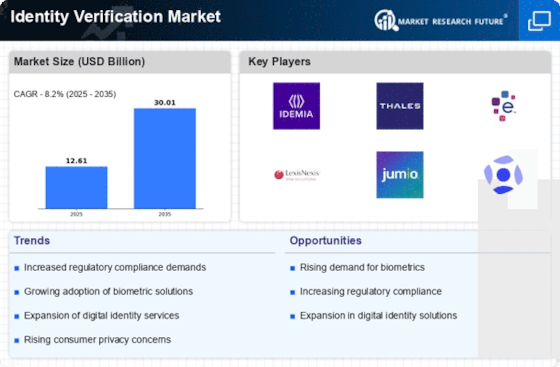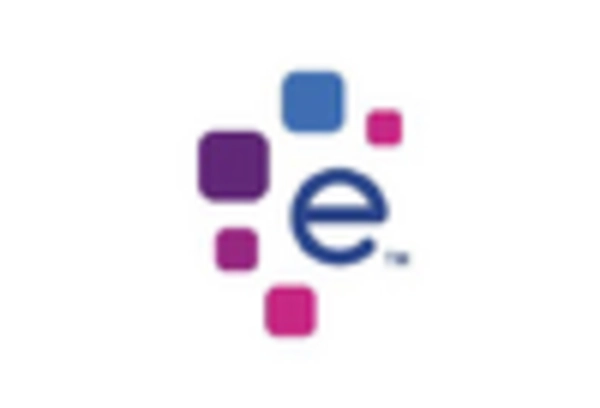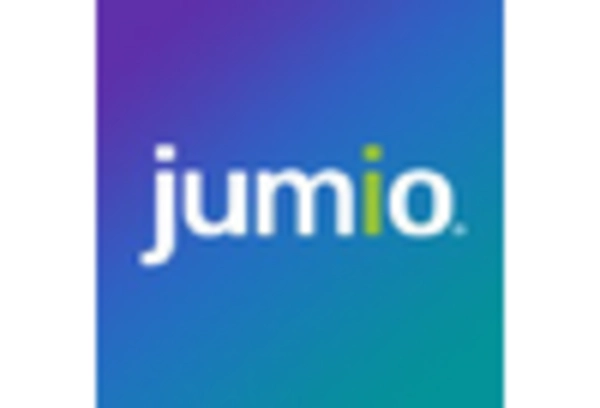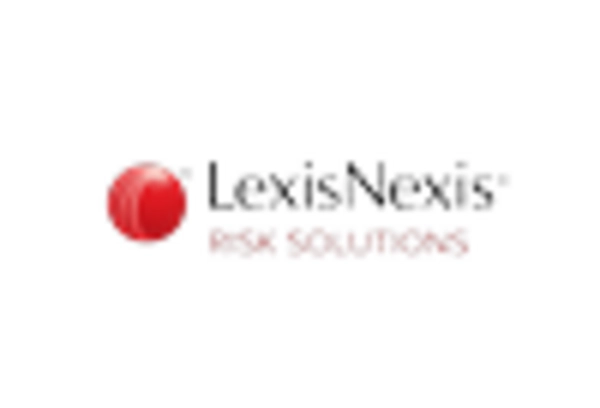Biometric
Artificial Intelligence
Document Verification
Knowledge-Based Authentication
Digital Identity
Single Factor Authentication
Two Factor Authentication
Multi Factor Authentication
Banking and Financial Services
Government
Telecommunications
E-Commerce
Healthcare
On-Premises
Cloud-Based
North America
Europe
South America
Asia Pacific
Middle East and Africa
North America Outlook (USD Billion, 2019-2035)
North America Identity Verification Market by Technology Type
Biometric
Artificial Intelligence
Document Verification
Knowledge-Based Authentication
Digital Identity
North America Identity Verification Market by Authentication Method Type
Single Factor Authentication
Two Factor Authentication
Multi Factor Authentication
North America Identity Verification Market by End Use Type
Banking and Financial Services
Government
Telecommunications
E-Commerce
Healthcare
North America Identity Verification Market by Deployment Mode Type
On-Premises
Cloud-Based
North America Identity Verification Market by Regional Type
US
Canada
US Outlook (USD Billion, 2019-2035)
US Identity Verification Market by Technology Type
Biometric
Artificial Intelligence
Document Verification
Knowledge-Based Authentication
Digital Identity
US Identity Verification Market by Authentication Method Type
Single Factor Authentication
Two Factor Authentication
Multi Factor Authentication
US Identity Verification Market by End Use Type
Banking and Financial Services
Government
Telecommunications
E-Commerce
Healthcare
US Identity Verification Market by Deployment Mode Type
On-Premises
Cloud-Based
CANADA Outlook (USD Billion, 2019-2035)
CANADA Identity Verification Market by Technology Type
Biometric
Artificial Intelligence
Document Verification
Knowledge-Based Authentication
Digital Identity
CANADA Identity Verification Market by Authentication Method Type
Single Factor Authentication
Two Factor Authentication
Multi Factor Authentication
CANADA Identity Verification Market by End Use Type
Banking and Financial Services
Government
Telecommunications
E-Commerce
Healthcare
CANADA Identity Verification Market by Deployment Mode Type
On-Premises
Cloud-Based
Europe Outlook (USD Billion, 2019-2035)
Europe Identity Verification Market by Technology Type
Biometric
Artificial Intelligence
Document Verification
Knowledge-Based Authentication
Digital Identity
Europe Identity Verification Market by Authentication Method Type
Single Factor Authentication
Two Factor Authentication
Multi Factor Authentication
Europe Identity Verification Market by End Use Type
Banking and Financial Services
Government
Telecommunications
E-Commerce
Healthcare
Europe Identity Verification Market by Deployment Mode Type
On-Premises
Cloud-Based
Europe Identity Verification Market by Regional Type
Germany
UK
France
Russia
Italy
Spain
Rest of Europe
GERMANY Outlook (USD Billion, 2019-2035)
GERMANY Identity Verification Market by Technology Type
Biometric
Artificial Intelligence
Document Verification
Knowledge-Based Authentication
Digital Identity
GERMANY Identity Verification Market by Authentication Method Type
Single Factor Authentication
Two Factor Authentication
Multi Factor Authentication
GERMANY Identity Verification Market by End Use Type
Banking and Financial Services
Government
Telecommunications
E-Commerce
Healthcare
GERMANY Identity Verification Market by Deployment Mode Type
On-Premises
Cloud-Based
UK Outlook (USD Billion, 2019-2035)
UK Identity Verification Market by Technology Type
Biometric
Artificial Intelligence
Document Verification
Knowledge-Based Authentication
Digital Identity
UK Identity Verification Market by Authentication Method Type
Single Factor Authentication
Two Factor Authentication
Multi Factor Authentication
UK Identity Verification Market by End Use Type
Banking and Financial Services
Government
Telecommunications
E-Commerce
Healthcare
UK Identity Verification Market by Deployment Mode Type
On-Premises
Cloud-Based
FRANCE Outlook (USD Billion, 2019-2035)
FRANCE Identity Verification Market by Technology Type
Biometric
Artificial Intelligence
Document Verification
Knowledge-Based Authentication
Digital Identity
FRANCE Identity Verification Market by Authentication Method Type
Single Factor Authentication
Two Factor Authentication
Multi Factor Authentication
FRANCE Identity Verification Market by End Use Type
Banking and Financial Services
Government
Telecommunications
E-Commerce
Healthcare
FRANCE Identity Verification Market by Deployment Mode Type
On-Premises
Cloud-Based
RUSSIA Outlook (USD Billion, 2019-2035)
RUSSIA Identity Verification Market by Technology Type
Biometric
Artificial Intelligence
Document Verification
Knowledge-Based Authentication
Digital Identity
RUSSIA Identity Verification Market by Authentication Method Type
Single Factor Authentication
Two Factor Authentication
Multi Factor Authentication
RUSSIA Identity Verification Market by End Use Type
Banking and Financial Services
Government
Telecommunications
E-Commerce
Healthcare
RUSSIA Identity Verification Market by Deployment Mode Type
On-Premises
Cloud-Based
ITALY Outlook (USD Billion, 2019-2035)
ITALY Identity Verification Market by Technology Type
Biometric
Artificial Intelligence
Document Verification
Knowledge-Based Authentication
Digital Identity
ITALY Identity Verification Market by Authentication Method Type
Single Factor Authentication
Two Factor Authentication
Multi Factor Authentication
ITALY Identity Verification Market by End Use Type
Banking and Financial Services
Government
Telecommunications
E-Commerce
Healthcare
ITALY Identity Verification Market by Deployment Mode Type
On-Premises
Cloud-Based
SPAIN Outlook (USD Billion, 2019-2035)
SPAIN Identity Verification Market by Technology Type
Biometric
Artificial Intelligence
Document Verification
Knowledge-Based Authentication
Digital Identity
SPAIN Identity Verification Market by Authentication Method Type
Single Factor Authentication
Two Factor Authentication
Multi Factor Authentication
SPAIN Identity Verification Market by End Use Type
Banking and Financial Services
Government
Telecommunications
E-Commerce
Healthcare
SPAIN Identity Verification Market by Deployment Mode Type
On-Premises
Cloud-Based
REST OF EUROPE Outlook (USD Billion, 2019-2035)
REST OF EUROPE Identity Verification Market by Technology Type
Biometric
Artificial Intelligence
Document Verification
Knowledge-Based Authentication
Digital Identity
REST OF EUROPE Identity Verification Market by Authentication Method Type
Single Factor Authentication
Two Factor Authentication
Multi Factor Authentication
REST OF EUROPE Identity Verification Market by End Use Type
Banking and Financial Services
Government
Telecommunications
E-Commerce
Healthcare
REST OF EUROPE Identity Verification Market by Deployment Mode Type
On-Premises
Cloud-Based
APAC Outlook (USD Billion, 2019-2035)
APAC Identity Verification Market by Technology Type
Biometric
Artificial Intelligence
Document Verification
Knowledge-Based Authentication
Digital Identity
APAC Identity Verification Market by Authentication Method Type
Single Factor Authentication
Two Factor Authentication
Multi Factor Authentication
APAC Identity Verification Market by End Use Type
Banking and Financial Services
Government
Telecommunications
E-Commerce
Healthcare
APAC Identity Verification Market by Deployment Mode Type
On-Premises
Cloud-Based
APAC Identity Verification Market by Regional Type
China
India
Japan
South Korea
Malaysia
Thailand
Indonesia
Rest of APAC
CHINA Outlook (USD Billion, 2019-2035)
CHINA Identity Verification Market by Technology Type
Biometric
Artificial Intelligence
Document Verification
Knowledge-Based Authentication
Digital Identity
CHINA Identity Verification Market by Authentication Method Type
Single Factor Authentication
Two Factor Authentication
Multi Factor Authentication
CHINA Identity Verification Market by End Use Type
Banking and Financial Services
Government
Telecommunications
E-Commerce
Healthcare
CHINA Identity Verification Market by Deployment Mode Type
On-Premises
Cloud-Based
INDIA Outlook (USD Billion, 2019-2035)
INDIA Identity Verification Market by Technology Type
Biometric
Artificial Intelligence
Document Verification
Knowledge-Based Authentication
Digital Identity
INDIA Identity Verification Market by Authentication Method Type
Single Factor Authentication
Two Factor Authentication
Multi Factor Authentication
INDIA Identity Verification Market by End Use Type
Banking and Financial Services
Government
Telecommunications
E-Commerce
Healthcare
INDIA Identity Verification Market by Deployment Mode Type
On-Premises
Cloud-Based
JAPAN Outlook (USD Billion, 2019-2035)
JAPAN Identity Verification Market by Technology Type
Biometric
Artificial Intelligence
Document Verification
Knowledge-Based Authentication
Digital Identity
JAPAN Identity Verification Market by Authentication Method Type
Single Factor Authentication
Two Factor Authentication
Multi Factor Authentication
JAPAN Identity Verification Market by End Use Type
Banking and Financial Services
Government
Telecommunications
E-Commerce
Healthcare
JAPAN Identity Verification Market by Deployment Mode Type
On-Premises
Cloud-Based
SOUTH KOREA Outlook (USD Billion, 2019-2035)
SOUTH KOREA Identity Verification Market by Technology Type
Biometric
Artificial Intelligence
Document Verification
Knowledge-Based Authentication
Digital Identity
SOUTH KOREA Identity Verification Market by Authentication Method Type
Single Factor Authentication
Two Factor Authentication
Multi Factor Authentication
SOUTH KOREA Identity Verification Market by End Use Type
Banking and Financial Services
Government
Telecommunications
E-Commerce
Healthcare
SOUTH KOREA Identity Verification Market by Deployment Mode Type
On-Premises
Cloud-Based
MALAYSIA Outlook (USD Billion, 2019-2035)
MALAYSIA Identity Verification Market by Technology Type
Biometric
Artificial Intelligence
Document Verification
Knowledge-Based Authentication
Digital Identity
MALAYSIA Identity Verification Market by Authentication Method Type
Single Factor Authentication
Two Factor Authentication
Multi Factor Authentication
MALAYSIA Identity Verification Market by End Use Type
Banking and Financial Services
Government
Telecommunications
E-Commerce
Healthcare
MALAYSIA Identity Verification Market by Deployment Mode Type
On-Premises
Cloud-Based
THAILAND Outlook (USD Billion, 2019-2035)
THAILAND Identity Verification Market by Technology Type
Biometric
Artificial Intelligence
Document Verification
Knowledge-Based Authentication
Digital Identity
THAILAND Identity Verification Market by Authentication Method Type
Single Factor Authentication
Two Factor Authentication
Multi Factor Authentication
THAILAND Identity Verification Market by End Use Type
Banking and Financial Services
Government
Telecommunications
E-Commerce
Healthcare
THAILAND Identity Verification Market by Deployment Mode Type
On-Premises
Cloud-Based
INDONESIA Outlook (USD Billion, 2019-2035)
INDONESIA Identity Verification Market by Technology Type
Biometric
Artificial Intelligence
Document Verification
Knowledge-Based Authentication
Digital Identity
INDONESIA Identity Verification Market by Authentication Method Type
Single Factor Authentication
Two Factor Authentication
Multi Factor Authentication
INDONESIA Identity Verification Market by End Use Type
Banking and Financial Services
Government
Telecommunications
E-Commerce
Healthcare
INDONESIA Identity Verification Market by Deployment Mode Type
On-Premises
Cloud-Based
REST OF APAC Outlook (USD Billion, 2019-2035)
REST OF APAC Identity Verification Market by Technology Type
Biometric
Artificial Intelligence
Document Verification
Knowledge-Based Authentication
Digital Identity
REST OF APAC Identity Verification Market by Authentication Method Type
Single Factor Authentication
Two Factor Authentication
Multi Factor Authentication
REST OF APAC Identity Verification Market by End Use Type
Banking and Financial Services
Government
Telecommunications
E-Commerce
Healthcare
REST OF APAC Identity Verification Market by Deployment Mode Type
On-Premises
Cloud-Based
South America Outlook (USD Billion, 2019-2035)
South America Identity Verification Market by Technology Type
Biometric
Artificial Intelligence
Document Verification
Knowledge-Based Authentication
Digital Identity
South America Identity Verification Market by Authentication Method Type
Single Factor Authentication
Two Factor Authentication
Multi Factor Authentication
South America Identity Verification Market by End Use Type
Banking and Financial Services
Government
Telecommunications
E-Commerce
Healthcare
South America Identity Verification Market by Deployment Mode Type
On-Premises
Cloud-Based
South America Identity Verification Market by Regional Type
Brazil
Mexico
Argentina
Rest of South America
BRAZIL Outlook (USD Billion, 2019-2035)
BRAZIL Identity Verification Market by Technology Type
Biometric
Artificial Intelligence
Document Verification
Knowledge-Based Authentication
Digital Identity
BRAZIL Identity Verification Market by Authentication Method Type
Single Factor Authentication
Two Factor Authentication
Multi Factor Authentication
BRAZIL Identity Verification Market by End Use Type
Banking and Financial Services
Government
Telecommunications
E-Commerce
Healthcare
BRAZIL Identity Verification Market by Deployment Mode Type
On-Premises
Cloud-Based
MEXICO Outlook (USD Billion, 2019-2035)
MEXICO Identity Verification Market by Technology Type
Biometric
Artificial Intelligence
Document Verification
Knowledge-Based Authentication
Digital Identity
MEXICO Identity Verification Market by Authentication Method Type
Single Factor Authentication
Two Factor Authentication
Multi Factor Authentication
MEXICO Identity Verification Market by End Use Type
Banking and Financial Services
Government
Telecommunications
E-Commerce
Healthcare
MEXICO Identity Verification Market by Deployment Mode Type
On-Premises
Cloud-Based
ARGENTINA Outlook (USD Billion, 2019-2035)
ARGENTINA Identity Verification Market by Technology Type
Biometric
Artificial Intelligence
Document Verification
Knowledge-Based Authentication
Digital Identity
ARGENTINA Identity Verification Market by Authentication Method Type
Single Factor Authentication
Two Factor Authentication
Multi Factor Authentication
ARGENTINA Identity Verification Market by End Use Type
Banking and Financial Services
Government
Telecommunications
E-Commerce
Healthcare
ARGENTINA Identity Verification Market by Deployment Mode Type
On-Premises
Cloud-Based
REST OF SOUTH AMERICA Outlook (USD Billion, 2019-2035)
REST OF SOUTH AMERICA Identity Verification Market by Technology Type
Biometric
Artificial Intelligence
Document Verification
Knowledge-Based Authentication
Digital Identity
REST OF SOUTH AMERICA Identity Verification Market by Authentication Method Type
Single Factor Authentication
Two Factor Authentication
Multi Factor Authentication
REST OF SOUTH AMERICA Identity Verification Market by End Use Type
Banking and Financial Services
Government
Telecommunications
E-Commerce
Healthcare
REST OF SOUTH AMERICA Identity Verification Market by Deployment Mode Type
On-Premises
Cloud-Based
MEA Outlook (USD Billion, 2019-2035)
MEA Identity Verification Market by Technology Type
Biometric
Artificial Intelligence
Document Verification
Knowledge-Based Authentication
Digital Identity
MEA Identity Verification Market by Authentication Method Type
Single Factor Authentication
Two Factor Authentication
Multi Factor Authentication
MEA Identity Verification Market by End Use Type
Banking and Financial Services
Government
Telecommunications
E-Commerce
Healthcare
MEA Identity Verification Market by Deployment Mode Type
On-Premises
Cloud-Based
MEA Identity Verification Market by Regional Type
GCC Countries
South Africa
Rest of MEA
GCC COUNTRIES Outlook (USD Billion, 2019-2035)
GCC COUNTRIES Identity Verification Market by Technology Type
Biometric
Artificial Intelligence
Document Verification
Knowledge-Based Authentication
Digital Identity
GCC COUNTRIES Identity Verification Market by Authentication Method Type
Single Factor Authentication
Two Factor Authentication
Multi Factor Authentication
GCC COUNTRIES Identity Verification Market by End Use Type
Banking and Financial Services
Government
Telecommunications
E-Commerce
Healthcare
GCC COUNTRIES Identity Verification Market by Deployment Mode Type
On-Premises
Cloud-Based
SOUTH AFRICA Outlook (USD Billion, 2019-2035)
SOUTH AFRICA Identity Verification Market by Technology Type
Biometric
Artificial Intelligence
Document Verification
Knowledge-Based Authentication
Digital Identity
SOUTH AFRICA Identity Verification Market by Authentication Method Type
Single Factor Authentication
Two Factor Authentication
Multi Factor Authentication
SOUTH AFRICA Identity Verification Market by End Use Type
Banking and Financial Services
Government
Telecommunications
E-Commerce
Healthcare
SOUTH AFRICA Identity Verification Market by Deployment Mode Type
On-Premises
Cloud-Based
REST OF MEA Outlook (USD Billion, 2019-2035)
REST OF MEA Identity Verification Market by Technology Type
Biometric
Artificial Intelligence
Document Verification
Knowledge-Based Authentication
Digital Identity
REST OF MEA Identity Verification Market by Authentication Method Type
Single Factor Authentication
Two Factor Authentication
Multi Factor Authentication
REST OF MEA Identity Verification Market by End Use Type
Banking and Financial Services
Government
Telecommunications
E-Commerce
Healthcare
REST OF MEA Identity Verification Market by Deployment Mode Type
On-Premises
Cloud-Based


















Leave a Comment